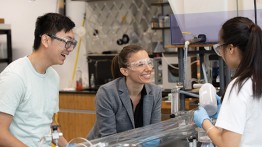Changing Technology and Emerging Leadership

The role and influence of technological innovation on the human experience has fundamentally changed in the recent past. Historically, technology played a secondary and supportive role while social, economic, political, and cultural dimensions played a primary role. Today, technological innovation is actually leading these dimensions in the influence on humanity.
Consider, for example, recent influences of technologies like personal communication, robotics, distributed computing, cyber, and others on the human dimension. Smart phones have advanced to a point where they not only allow 24/7 connectivity but they provide geolocation information to aid in personal navigation, provide geotagged high-resolution photographs and videos, monitor personal health and fitness, and provide real-time language translation.
Robotics applications are diverse and include industrial automation, video collaboration, co-robots acting in direct support of and in a symbiotic relationship with human partners, autonomous vehicles and even robotically-assisted minimally-invasive surgery. The cloud is now where data is accessed, processed, and stored. There have been numerous headlines in The New York Times, The Wall Street Journal, Bloomberg News, and others reporting cyber-attacks that subsequently resulted in geopolitical consequences.
With the knowledge of this changed role of technological innovation, the primary question to ask is what attributes will future professionals require to succeed and lead in this new environment? A 2016 survey of CEOs by PricewaterhouseCoopers provides some insights. According to the survey, industry leaders are looking for employees to do more than perform well as skilled professionals. They also want them to anticipate external issues—such as public policies and regulation, and the convergence of technologies—that affect their disciplines and fields of interest. The CEOs also place high value on the ability to work collaboratively—with fellow professionals, stakeholders, and others—to create comprehensive, balanced, and effective initiatives and solutions. The ability to build diverse and well-aligned partnerships will be a hallmark of successful leaders in our fields. Similarly, tomorrow’s technology leaders must work as synthesists— individuals who can draw expertise from an array of disciplines and bring that knowledge to bear on multidisciplinary and interdisciplinary problems.
A successful leader in such an environment will have to draw not only on deep disciplinary knowledge but also on modern professional skills: written and oral communications, teamwork, critical thinking, innovation, and entrepreneurship. Some have called this the rise of the “T-shaped” individual, a reference to a deep knowledge of a single field of interest coupled with other broad abilities—the so-called soft skills and a firm grounding in collaboration. We are committed to further expand beyond disciplinary knowledge and modern professional skills and include ethical design, social responsibility, civic virtue, and the courage to act.
Adapted from the original article The Face of Leadership, B.L. Shoop, "The Institute," IEEE, March 2016




